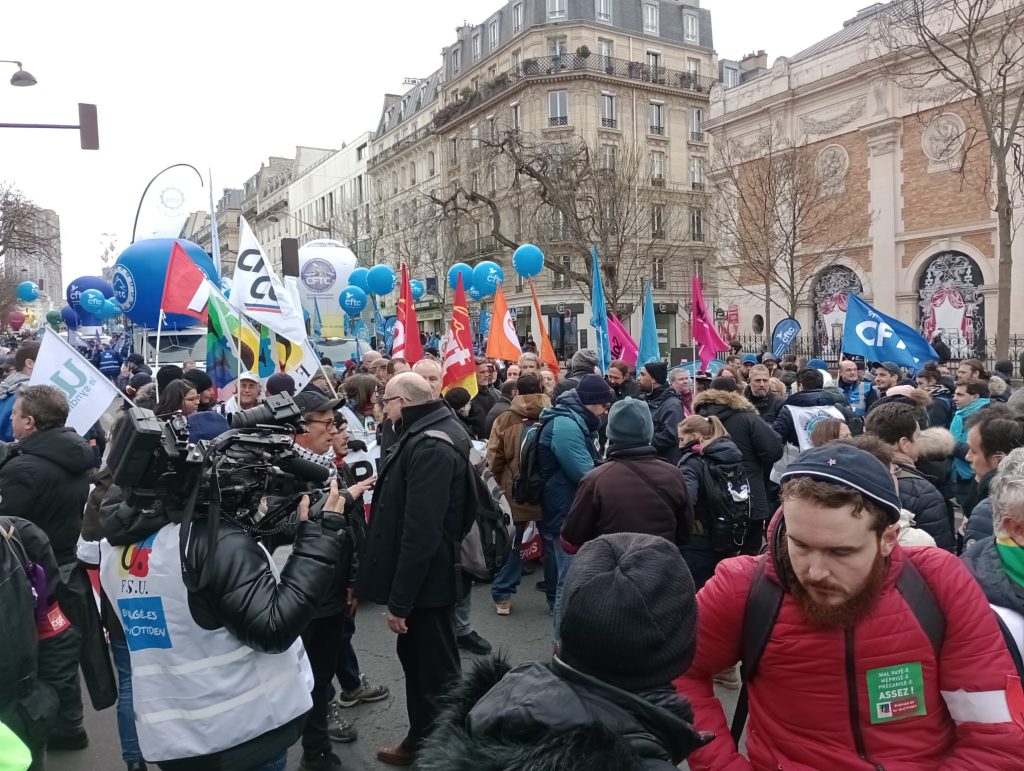El martes 31 de enero, una nueva huelga general con movilización sacudió a toda Francia. Es la segunda jornada masiva de lucha contra la reforma anti-jubilatoria que pretende imponer el presidente Emmanuel Macron. Cuáles son los desafíos para ganar esta dura pulseada.
Pablo Vasco, desde París
La CGT subió la concurrencia a las movilizaciones de dos millones a nivel nacional el 19 de enero a 2,8 millones este 31. Pero las propias cifras oficiales no dejan demasiado margen para polémicas. El ministro del Interior, Gérald Darmanin, que el 19 informó 1.120.000 personas movilizadas, ahora tuvo que reconocer más de 1.270.000. Es decir, más que la vez anterior. En París, medio millón marchamos durante varias horas desde Place d’Italie hasta Place Vauban.
En menos de dos semanas, y pese a que la primera ministra Elisabeth Borne afirmó que el retiro jubilatorio a 64 años “no se negocia más”, pese al despliegue policial intimidatorio y pese a las vacilaciones de la burocracia de las centrales nucleadas en la Intersindical[1], el movimiento anti-reforma claramente se fortaleció.
Un dato no menor es el alto nivel de movilización popular que hubo en las ciudades medianas y pequeñas del interior del país, lo que expresa un fuerte rechazo a la reforma por parte de la llamada “Francia profunda”, que a diferencia de París y otras grandes ciudades es normalmente más calma. Sin aún ser masivas, también las asambleas previas, los bloqueos en varios colegios secundarios y las columnas estudiantiles en las manifestaciones mostraron que crece el involucramiento de la juventud.

Es posible vencer a Macron y la patronal
En cuanto a la huelga, las tasas de participación siguen evidenciando fuertes desigualdades. Los trabajadores de todo el transporte público (subtes, autobuses y trenes de cercanías, interurbanos y de alta velocidad), de las refinerías petroleras y de la educación nacional volvieron a tener un alto cumplimiento. En cambio, en otros sectores fue sin duda inferior. Es que los descuentos de salarios por los días de paro, más una conducción sindical que hace “presión” pero no se juega a derrotar la reforma, generan lógicas dudas entre los trabajadores.
Anoche mismo, tras las marchas, la Intersindical anunció dos nuevas fechas de huelga y movilización para estos próximos días: el martes 7 y el sábado 11 de febrero. “El gobierno debe escuchar el rechazo masivo a este proyecto y retirarlo”, dijeron en su comunicado de prensa. Pero algunos gremios van más allá. Los obreros refineros de la CGT-Petróleo, por ejemplo, prevén hacer paro los días 6, 7 y 8.
Para ganar esta pulseada trascendente, en cada sector de trabajo las bases deben tomar la pelea en sus propias manos, a través de asambleas generales y buscando a la vez la coordinación interprofesional de los diversos sectores. Allí debatir y votar un plan de lucha hasta el retiro definitivo de la reforma. Asimismo, la exigencia de un aumento salarial inmediato se debería incorporar al programa de lucha. Con estos reaseguros, hay posibilidades de victoria contra Macron y los capitalistas.
En este marco, el ala revolucionaria del NPA, en la que militamos los compañeros de la LIS en Francia, prepara con todo entusiasmo el acto del miércoles 8 de febrero en La Bellevilloise, en París.

[1] CFDT, CGT, FO, CFE-CGC, CFTC, Unsa, Solidaires, FSU.




